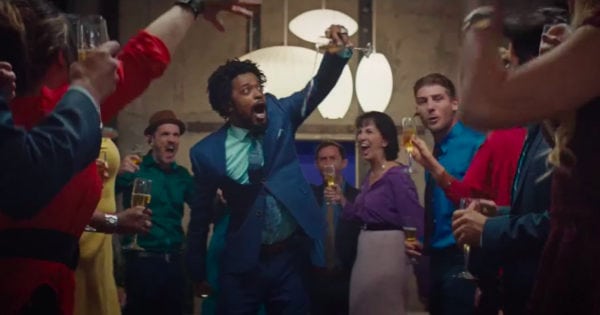Sorry to Bother You, 2018.
Directed by Boots Riley.
Starring Lakeith Stanfield, David Cross, Tessa Thompson, Jermaine Fowler, Omari Hardwick, Patton Oswalt, Terry Crews, Danny Glover, Steven Yeun, Armie Hammer, and Kate Berlant.
SYNOPSIS:
Sorry to Bother You starts as a skewering of modern-day race relations and ends up going in directions that are impossible to predict. It’s a trip through magical realism that’s worth taking, and it’s a marvelous directorial debut by Boots Riley. This Blu-ray edition is a bit scant on bonus features, but Riley’s interview and commentary track are both worth your time.
I love it when a movie takes a couple left turns and becomes something I could have never expected as act one unspooled. Such was the case with Boots Riley’s directorial debut, Sorry to Bother You, which starts as an Office Space-esque dig at the modern working world, with a nod to Being John Malkovich, and ends up in territory that could live in Terry Gilliam’s fevered imagination.
Our protagonist is Cassius “Cash” Green (Lakeith Stanfield), a down-on-his-luck guy living in Oakland and trying to get a job as a telemarketer. He tries to bullshit his way into a position and his subterfuge is revealed by the hiring manager, who admires Cassius’s chutzpah and gives him the job on the spot. There’s a promise that if he can perform well, he can be promoted to the upstairs office, where the telemarketers make the big bucks.
An older telemarketer, played by Danny Glover, encourages Cassius to use his “white voice” to make sales, and, lo and behold, when the silky tones of David Cross come out of his mouth, Cassius is able to close plenty of deals. He recruits his girlfriend, a struggling artist named Detroit (Tessa Thompson), to join him at the company, where his friend Sal also works.
A fellow co-worker, Squeeze (Steven Yeun), recruits Cassius to help him unionize all the telemarketers, but Cassius’s success earns him a promotion to PowerCaller on the floor above and he accepts, much to the chagrin of Squeeze, his girlfriend, and Sal. Cassius discovers that his new job involves closing deals on behalf of WorryFree, a company that advertises throughout Oakland and which promises workers food and shelter in exchange for turning their freedom over.
Detroit ends up joining The Left Eye, a protest group that defaces WorryFree’s ads and does what it can to subvert the company’s agenda. Cassius eventually meets Steve Lift (Armie Hammer), WorryFree’s CEO, and discovers the company’s evil agenda. That’s where Sorry to Bother You takes a major turn into the world of magical realism, as Riley describes it, but don’t worry – I won’t spoil anything for you. It’s a twist that you need to experience for yourself.
The film’s shift is jarring, but it’s not really a major change in tone. There are hints that this story world is quite different from our own, including WorryFree’s bizarre ads and the way other characters accept Cassius’s “white voice,” which is also a feature of his manager when he’s promoted to PowerCaller. (Patton Oswalt provides the voice for that character.)
I admit I thought this would be a movie about how African-Americans can often find success when they “act white,” so to speak, a phenomenon that’s been backed up by various experiments. And that probably would have made an intriguing movie about racial dynamics in the United States, but Riley decided to push his narrative further and explore the direction corporate America is taking. Would you turn over your freedom in exchange for “three hots and a cot,” as one of the character says?
In the bonus features on this Blu-ray disc, Riley notes that the title of the movie is not only a nod to something telemarketers often say when interrupting people’s lives, but it’s also a reference to the idea that the film’s concepts will get in the way of our complacent existences. Sorry to Bother You forces the viewer to deal with some uncomfortable ideas, and there’s nothing wrong with that.
This Blu-ray release also includes a DVD as well as a code for a digital copy of the movie. The lone making-of featurette is a 12-minute interview with Riley called Beautiful Clutter. He also participated in a thoughtful commentary track that talks about the making of the movie, which was an arduous process for him. It’s worth a listen to understand his philosophy toward the film.
It’s a bummer that this release doesn’t have more extensive making-of materials, but perhaps a company like Criterion will fix that one of these days.
Flickering Myth Rating – Film: ★ ★ ★ ★ / Movie: ★ ★ ★ ★
Brad Cook














